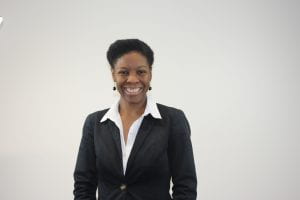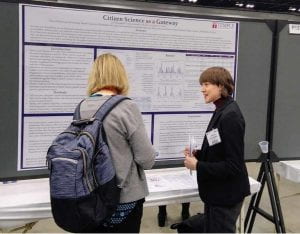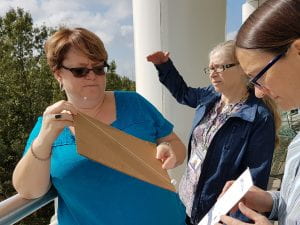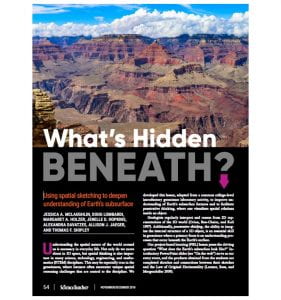 We are pleased to announce SLRG senior PhD student Shondricka Burrell has been selected to participate in NYU’s Steinhardt’s Faculty First-Look program. This is a prestigious program involving talented, underrepresented scholars in the Academy and providing them guidance into what it takes to prepare for future faculty careers. Scholars will have unique mentoring and networking opportunities directly with NYU deans, faculty, and post docs. The newly selected Faculty-First Look cohort will:
We are pleased to announce SLRG senior PhD student Shondricka Burrell has been selected to participate in NYU’s Steinhardt’s Faculty First-Look program. This is a prestigious program involving talented, underrepresented scholars in the Academy and providing them guidance into what it takes to prepare for future faculty careers. Scholars will have unique mentoring and networking opportunities directly with NYU deans, faculty, and post docs. The newly selected Faculty-First Look cohort will:
• Learn best practices to prepare for the faculty recruitment, application, interview, and selection process;
• Learn best practices for how to use digital/social media platforms to increase scholarly visibility in the job market and beyond;
• Receive access to continuous faculty development opportunities.
Prior to being selected as a Faculty-First Look Scholar, Shondricka has previously been recognized for her research, receiving the Richard C. Anderson Graduate Student Research Award from the National Consortium for Instruction and Cognition, and a graduate student research grant from the Geological Society of America. Shondricka has also been named a Jhumki Basu Scholar by the National Association for Research in Science Teaching (NARST) and is a Community for Advancing Discovery Research in Education (CADRE) fellow.
Please check out Shondricka’s full profile as a 2018-19 Faculty-First-Look Scholar: https://steinhardt.nyu.edu/faculty_affairs/facultyfirstlook2018scholars
 Congratulations to Ananya Matewos on the publication of her new article on makerspaces, which are an increasingly popular way to promote design-based learning. The full article is available for download because it was published in the open-access International Journal of STEM Education. To access the article, click here.
Congratulations to Ananya Matewos on the publication of her new article on makerspaces, which are an increasingly popular way to promote design-based learning. The full article is available for download because it was published in the open-access International Journal of STEM Education. To access the article, click here. Congratulations to Jess McLaughlin on her poster on the use of citizen science as a way to support inclusive education in college level geoscience classes at the 130th annual Geological Society of America meeting this November. While the poster was not related to work with SLRG, we wanted to take this opportunity to highlight the disciplinary diversity of our group!
Congratulations to Jess McLaughlin on her poster on the use of citizen science as a way to support inclusive education in college level geoscience classes at the 130th annual Geological Society of America meeting this November. While the poster was not related to work with SLRG, we wanted to take this opportunity to highlight the disciplinary diversity of our group!
 AAPT has announced that Janelle M. Bailey, Assistant Professor, College of Education, Temple University, will receive the association’s 2019 Homer L. Dodge Citation for Distinguished Service to the American Association of Physics Teachers (AAPT). She has provided leadership and service to the association for many years, culminating in being President in 2016. This award is presented to members in recognition of their exceptional contributions to the association at the national, sectional, or local level.
AAPT has announced that Janelle M. Bailey, Assistant Professor, College of Education, Temple University, will receive the association’s 2019 Homer L. Dodge Citation for Distinguished Service to the American Association of Physics Teachers (AAPT). She has provided leadership and service to the association for many years, culminating in being President in 2016. This award is presented to members in recognition of their exceptional contributions to the association at the national, sectional, or local level.
 We are pleased to announce SLRG senior PhD student Shondricka Burrell has been selected to participate in NYU’s Steinhardt’s Faculty First-Look program. This is a prestigious program involving talented, underrepresented scholars in the Academy and providing them guidance into what it takes to prepare for future faculty careers. Scholars will have unique mentoring and networking opportunities directly with NYU deans, faculty, and post docs. The newly selected Faculty-First Look cohort will:
We are pleased to announce SLRG senior PhD student Shondricka Burrell has been selected to participate in NYU’s Steinhardt’s Faculty First-Look program. This is a prestigious program involving talented, underrepresented scholars in the Academy and providing them guidance into what it takes to prepare for future faculty careers. Scholars will have unique mentoring and networking opportunities directly with NYU deans, faculty, and post docs. The newly selected Faculty-First Look cohort will: